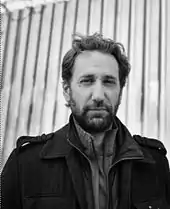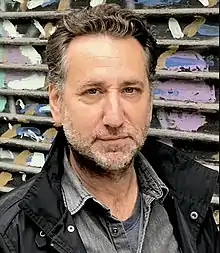Julian Rubinstein
Julian Rubinstein (born December 27, 1968) is an award-winning journalist, author, producer and educator. He is best known for his non-fiction book, Ballad of the Whiskey Robber,[1] which chronicled the life of one of the world's most popular living folk heroes.


Early life
Rubinstein was born in the Bronx in 1968. He is the son of the psychiatrist David Rubinstein and the aerospace engineer Diane Rubinstein. The family moved to Denver from New York City in 1971 when David Rubinstein accepted a residency at the University of Colorado Medical School. Dr. Rubinstein was drafted into the Air Force and became the base psychiatrist at Denver's now-closed Lowry Air Force Base in the 1970s, retiring as a major. Dr. Rubinstein was an attending at several Denver-area hospitals. At age 49, he was diagnosed with cancer and became known posthumously for his work counseling residents at Hospice of Metro Denver who didn't know he too was dying.[2][3] Diane Rubinstein worked much of her career on high clearance government contracts, including missile defense, and retired from Raytheon.
Rubinstein grew up in south Denver and attended Cherry Creek High School. He went on to receive a B.A. in Political Science from Emory University and an M.S. in Journalism from Columbia University's Graduate School of Journalism, in 1992.
Rubinstein's younger brother, Dan Rubinstein, is the elected district attorney in Mesa County, Colorado.[4]
Career
Rubinstein began his career as an agate clerk in the Washington Post Sports section, and wrote for the Sports and Style section, where he did music reviews and features. In 1994, he was hired as a reporter at Sports Illustrated, where he worked for four years, covering tennis, NFL, NBA and extreme sports. In 1996, he worked with senior writer Gary Smith on "Crime and Punishment: The Saga of Richie Parker, which won the 1997 National Magazine Award for Feature Writing.[5] In 1998, Rubinstein went to work for CBS Sports at the Nagano Winter Olympics as the co-editor-in-chief of a daily publication.
Afterward, Rubinstein became a freelance journalist, making a name as a reporter who was able to find overlooked and mistold stories, and land difficult interviews. His story, They Call It Suicide, published in Rolling Stone in 2000,[6] was reported over several weeks in Mato Grosso do Sul in which he gained the trust of a Guarani Indian tribe fleeing the reservation in fear of its chief. International news stories reported that the tribe had the highest suicide rate in the world, but Rubinstein discovered evidence that the chief was murdering his own people. The chief was in an unholy alliance with wealthy ranchers, who were farming illegally on the reservation by taking over property. Some on the reservation who were considered a risk to report the activity were found dead next to trees, with a rope loosely tied around their necks next. Others were fleeing in fear.
Rubinstein also wrote what has been called the best profile of tennis player John McEnroe.[7] The unabridged version of the story appeared the literary sports journalism site, SportsJones.com and espn.com,[8] and an abridged version of the story was published in The New York Times Magazine in 2000.[9] Rubinstein also wrote about the Hells Angels, and the Hasidic international ecstasy kingpin, Jacob "Cookie" Orgad for Details magazine, which was selected for Best American Crime Writing.[10] In 2006, he wrote about his relationship with his father in 5280, Denver's city magazine. The story was listed as a notable story of the year in Best American Essays.[11]
In 2004, Rubinstein published his first non-fiction book Ballad of the Whiskey Robber, about the Hungarian bank robber and folk hero Attila Ambrus. The book won Borders' 2005 "Original Voices" Non-fiction Book of the Year prize[12] and was a finalist for the 2005 Edgar Allan Poe Award[13] and the 2005 Anthony Award. An audio cabaret recording of the book was a finalist at the 2007 Audie Awards for Best Audio Book. The performance stars Eric Bogosian, Demetri Martin, Samantha Power, Gary Shteyngart, Jonathan Ames, Arthur Phillips, Darin Strauss, and Tommy Ramone. Warner Bros. and Johnny Depp optioned the book for a film.
In 2013, Rubinstein's story Operation Easter[14] appeared in the New Yorker in which Rubinstein gained access to the notoriously tight knit and unapproachable illegal egg collectors in the U.K. The story was voted one of the "5 Most Entertaining Stories of the Year" by Longreads,[15] and was chosen as a Notable story of the Year by Best American Science and Nature Writing.
Rubinstein was also a contributor to the New York Times Arts & Leisure section, and a contributing editor to Travel & Leisure. He worked as an adjunct professor of journalism at Columbia University, and also as a senior producer for the school's Dart Center for Journalism and Trauma.[16] He has spoken at numerous events, universities and festivals around the world. He is a member of PEN America.
His work has been selected for the Best American Crime Writing anthology, The Best American Essays, and twice by The Best American Sports Writing.
Personal life
Rubinstein has worked with at-risk youth at Groundwork in Brooklyn, and at Friends For Youth in Colorado. His mentee Ngor Monday was killed in a shootout in 2019.[17] In 2014, Rubinstein moved back to Denver to pursue a new book project, which will be published by Farrar, Starus and Giroux in 2021. He lives in Denver with his partner, Sara Rosenthal, a staff nurse in the emergency department of Denver Health Hospital.
Bibliography
Books
- Rubinstein, Julian (2004). Ballad of the Whiskey Robber.
- Rubinstein, Julian (2009). "Leaving Home." Published in Writing Away From Home, International Authors In Brussels, cahier, het beschrijf, pp 141–145.
Articles
- Rubinstein, Julian (July 22, 2013). "A Reporter at Large: Operation Easter". The New Yorker. 89 (21): 52–61. Retrieved 2014-10-29.
- Rubinstein, Julian (January 27, 2000). "Being John McEnroe." The New York Times Magazine
- Rubinstein, Julian (June 8, 2000). "They Call It Suicide." Rolling Stone
- Rubinstein, Julian (September, 2001.) "X-Files." Details
References
- Ehrenreich, Ben (2004-11-14). "'Ballad of the Whiskey Robber': Neon Budapest (Published 2004)". The New York Times. ISSN 0362-4331. Retrieved 2021-01-23.
- Culver, Virginia (December 12, 2003). "Dying Doctor Counseled Terminally Ill, Wrote Children's Book". The Denver Post.
- Huntley, Sarah (December 9, 2003). "Dr. David Rubinstein Helped Ease Way for Dying Patients". Rocky Mountain News.
- "DA Home - Mesa County, Colorado". da.mesacounty.us. Retrieved 2021-01-23.
- Smith, Gary. "Crime And Punishment: The saga of Richie Parker". Sports Illustrated. Retrieved 2021-01-23.
- Rubinstein, Julian (June 8, 2000). "They Call It Suicide". Rolling Stone.
- "Being John McEnroe by Julian Rubinstein · Longform". Longform. Retrieved 2021-01-23.
- Rubinstein, Julian (September 19, 2001). "Being John McEnroe". espn.com.
- Rubinstein, Julian (February 27, 2000). ""Johnny Mac," Jack Nicolson Once Said, "Don't Ever Change." He Hasn't". The New York Times Magazine.
- www.amazon.com https://www.amazon.com/Best-American-Crime-Writing-Reporting/dp/0375712992/ref=sr_1_1?dchild=1&keywords=best+american+crime+writing+2002&qid=1611425003&sr=8-1. Retrieved 2021-01-23. Missing or empty
|title=(help) - bestamericanessays.neocities.org https://bestamericanessays.neocities.org/Best%20American%20Essays.html. Retrieved 2021-01-23. Missing or empty
|title=(help) - "Original Voices Awards". www.writerswrite.com. Retrieved 2021-01-23.
- "Category List – Best Fact Crime | Edgars Database". Retrieved 2021-01-23.
- Rubinstein, Julian. "Operation Easter". The New Yorker.
- Most Entertaining, Longform (2013). "Best of 2013". Longform.org.
- "Julian Rubinstein". Dart Center. 2012-09-10. Retrieved 2021-01-23.
- "Victim in double-shooting last week is identified". The Denver Post. 2019-09-13. Retrieved 2021-01-23.
External links
- Official Author Website
- Julian Rubinstein performs "Ballad of the Whiskey Robber" at the LitCologne Festival in Germany.
- Julian Rubinstein Talks About the Hells Angels on the O'Reilly Factor
- Ballad of the Whiskey Robber website
- Interview with Julian Rubinstein from Media Bistro
- Documentary Video of Julian Rubinstein Visiting Attila Ambrus in prison in Hungary